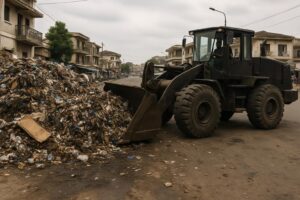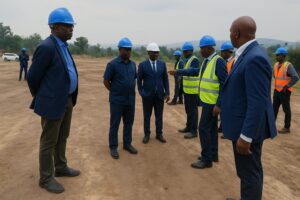Minister Mondelé launches sanitation quarter
Early on 30 August, Sibiti’s sun-baked main square turned into a stage for policy when Juste Désiré Mondelé, Minister for Urban Sanitation, Local Development and Road Maintenance, unveiled the “Lékoumou Sanitation Quarter”.
Flanked by local chiefs and students, the minister said the campaign ‘marks a decisive turn’, echoing the first National Forum on Urban Sanitation which called for stronger local ownership of waste management.
His words resonated loudly in a town experiencing rapid demographic growth, where plastic bags drift across drainage ditches and afternoon storms leave stagnant pools that become breeding grounds for insects.
By formally handing new wheelbarrows, shovels and reflective vests to Sibiti officials, Mondelé also signalled firm political support from Brazzaville, underlining President Denis Sassou Nguesso’s broader vision for healthier cities and inclusive prosperity.
Detailed three-month action plan
Running from September to November, the programme schedules weekly street sweepings, canal dredging, market disinfection and doorstep awareness visits designed to reduce illegal dumps and keep floodwater away from homes safely.
A media blitz on community radio, posters and social networks will amplify the message, while monthly Clean Saturday events aim to turn sanitation into a tradition rather than a chore.
Authorities have earmarked classrooms, the under-construction central hospital and even Sibiti’s modest airport for intensive cleaning, indicating an ambition that stretches beyond central boulevards toward every corner where residents gather each day.
Officials estimate more than ten tonnes of waste could be extracted during the first month alone, a figure based on similar drives in Pointe-Noire that saw visible drops in roadside litter last year.
Grassroots mobilisation and training
Community engagement sits at the heart of the plan, with church youth groups, women’s cooperatives and school eco-clubs all invited to join newly formed ‘salubrity brigades’ patrolling neighbourhoods during the three-month push.
Training sessions, partly funded by the Congolese Agency for Ecological Transition, will coach volunteers on sorting techniques and on how to turn household organics into compost for urban gardens across the city.
Radio presenter Simone Mboungou says the peer approach works best. ‘When a neighbour explains that stagnant water brings mosquitoes, people listen differently than to distant experts,’ she said after recording a jingle.
Town Hall has meanwhile opened a feedback line where residents can report uncollected rubbish or suggest sites for upcoming Clean Saturdays, a move praised by civil-society monitors as boosting transparency and civic pride.
Road upgrade to support clean towns
Sanitation is not the only headline. On the same day, Mondelé kicked off rehabilitation of the 25-kilometre Komono-Mbila road, long plagued by potholes and seasonal mudslides that hamper rural market access.
Engineers from the Road Fund plan to stabilise the laterite base, install culverts and improve drainage, reducing travel time between farms and Sibiti’s wholesale centre, especially during the rainy season.
Prefect Jean Christophe Tchikaya argues the dual focus on roads and cleanliness makes strategic sense, because clogged ditches often damage freshly repaired surfaces and hinder trucks carrying cassava and timber to urban markets.
Local traders interviewed at Sibiti bus station already anticipate lower transport costs once the project finishes, a relief after fuel-price fluctuations squeezed profit margins this year across the supply chain.
Health and environmental dividends
Health specialists see wider dividends. World Health Organization data indicate that improved waste disposal can cut diarrhoeal disease by up to 40 percent, a gain particularly relevant for under-five children in Lékoumou.
Dr. Étienne Koumou at Sibiti’s district clinic welcomes the campaign, noting that ‘clean streets mean fewer consultations for skin infections and malaria, easing pressure on limited hospital beds’ during peak rainy months.
Environmental analysts add that sorting plastics for recycling could generate micro-enterprises, echoing successful pilots in Brazzaville where youth groups sell pellets to packaging factories, creating jobs close to home for graduates.
Moreover, cleaner waterways may bolster ecotourism around nearby forest reserves as visitors increasingly expect litter-free picnic spots and clear streams teeming with fish, benefiting community lodges and craft sellers along access roads there.
Monitoring progress and future rollout
The ministry has set up a joint monitoring committee with municipal officers, civil-society delegates and engineers to track indicators such as waste volume collected and citizen participation rates each fortnight throughout the quarter.
Regular reports will feed into national databases that inform budget allocations for 2024, aligning with Congo’s Sustainable Development Plan which pairs environmental action with job creation and improved access to basic services.
If the targets are met, officials hint the model could expand to other departments, turning the Lékoumou experiment into a template for grassroots sanitation across Congo-Brazzaville within the next two fiscal cycles.
For now, brooms are sweeping, ditches are being cleared and optimism hangs in the dusty air of Sibiti, offering a glimpse of how sustained civic effort can reshape everyday life for families and traders.





















